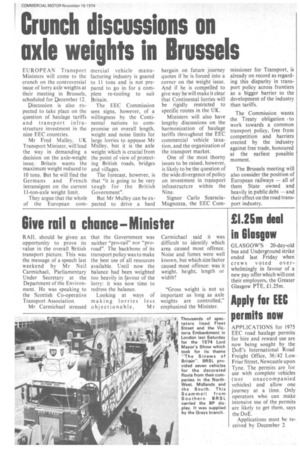Crunch discussions on axle weights in Brussels
Page 19

If you've noticed an error in this article please click here to report it so we can fix it.
EUROPEAN Transport Ministers will come to the crunch on the controversial issue of lorry axle weights at their meeting in Brussels, scheduled for December 12.
Discussion is also expected to take place on the question of haulage tariffs and transport infrastructure investment in the nine EEC countries.
Mr Fred Mulley, UK Transport Minister, will lead the way in demanding a decision on the axle-weight issue. Britain wants the maximum weight reduced to 10 tons. But he will find the Germans and French intransigent on the current 11-ton-axle weight limit.
They argue that the whole of the European corn
mercial vehicle manufacturing industry is geared to 11 tons and is not prepared to go in for a complete re-tooling to suit Britain.
The EEC Commission sees signs, however, of a willingness by the Continental nations to compromise on overall length, weight and noise limits for large lorries to appease Mr Mulley, but it is the axle weight which is crucial from the point of view of protecting British roads, bridges and villages.
The forecast, however, is that "it is going to be very tough for the British Government".
But Mr Mulley can be expected to drive a hard bargain on future journey quotes if he is forced into a corner on the weight issue. And if he is compelled to give way he will make it clear that Continental lorries will be rigidly restricted to specific routes in the UK.
Ministers will also have lengthy discussions on the harmonization of haulage tariffs throughout the EEC commercial vehicle taxation, and the organization of the transport market.
One of the most thorny issues to be raised, however, is likely to be the question of the wide divergence of policy on investment in transport infrastructure within the Nine.
Signor Carlo ScarsciaMugnozza, the EEC Corn missioner for Transport, is already on record as regarding this disparity in transport policy across frontiers as a bigger barrier to the development of the industry than tariffs.
The Commission wants the Treaty obligation 'to work towards a common transport policy, free from competition and barriers erected by the industry against free trade, honoured at the earliest possible moment.
The Brussels meeting will also consider the position of European railways — all of them State owned and heavily in public debt — and their effect on the road transport industry.




































































































